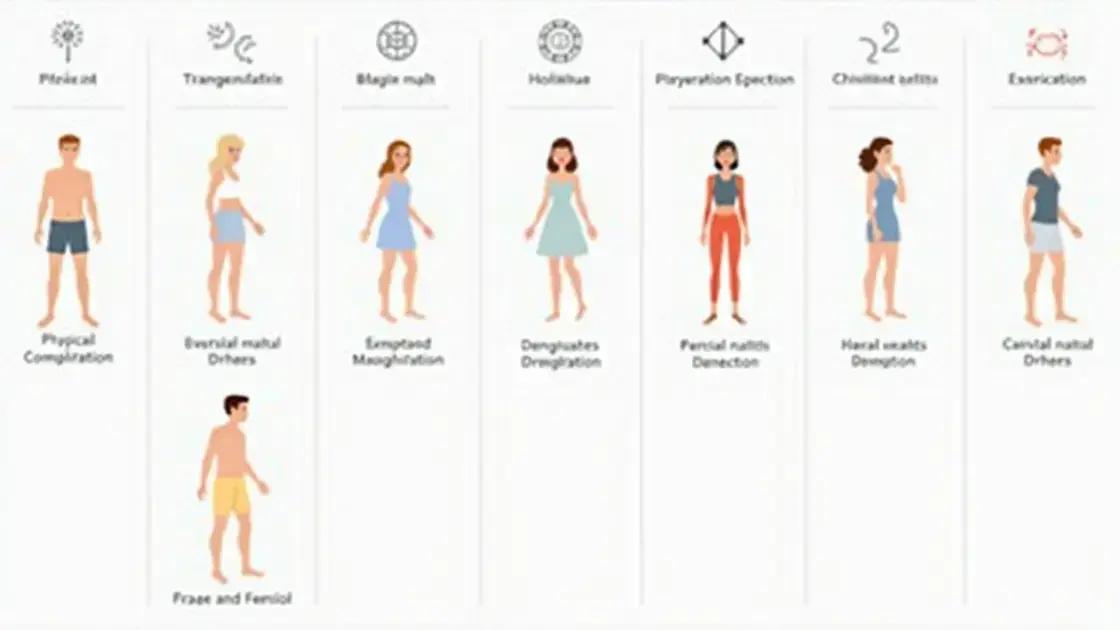Lifestyle changes such as improving your diet, exercising regularly, managing stress, and seeking professional help when necessary can effectively improve erectile dysfunction and enhance overall sexual health.
Erectile dysfunction (ED) affects many men and can be influenced by various lifestyle factors. Making specific lifestyle changes to improve erectile dysfunction can lead to better intimacy and overall health. From diet to exercise, this article will delve into practical adjustments you can make. We’ll explore how these changes can not only enhance your sexual performance but also boost your confidence and well-being.
Understanding Erectile Dysfunction

Erectile dysfunction (ED) is a common issue that many men face, particularly as they age. It is defined as the inability to achieve or maintain an erection sufficient for satisfactory sexual performance. Understanding erectile dysfunction is crucial for addressing this concern and improving one’s quality of life.
Causes of Erectile Dysfunction
There are several factors that can lead to erectile dysfunction. These include physical causes like heart disease, diabetes, and obesity. Psychological factors, such as stress, anxiety, and depression, can also play a significant role. Additionally, certain medications and lifestyle choices, like smoking and excessive alcohol consumption, may contribute to ED.
Symptoms of Erectile Dysfunction
The primary symptom of erectile dysfunction is difficulty achieving or maintaining an erection. Men may also experience reduced sexual desire or find that erections are not as firm as they used to be. These symptoms can cause distress in relationships and affect overall mental health.
Diagnosis of Erectile Dysfunction
To diagnose erectile dysfunction, healthcare providers often start with a physical exam and medical history. They may also conduct blood tests to check for underlying health concerns. Understanding the root cause is essential for effective treatment.
Impact on Relationships
ED can put a strain on relationships, as it may lead to feelings of embarrassment, anxiety, or inadequacy. Open communication with partners is essential to address these feelings. Discussing the issue can help both partners feel more connected and supportive during this challenging time.
Understanding erectile dysfunction is the first step toward improvement. By recognizing the causes, symptoms, and impacts of ED, men can seek the necessary help and make informed lifestyle changes.
The Role of Diet in Sexual Health

The role of diet in sexual health is significant and cannot be overlooked. Nutrition affects not only your overall well-being but also your sexual function. Incorporating specific foods into your daily meals can contribute to improved erectile function.
Essential Nutrients for Sexual Health
Key nutrients, such as vitamins and minerals, play an important role in maintaining good sexual health. Zinc is vital for testosterone production, while Vitamin D can help with blood flow. Foods rich in these nutrients include meat, shellfish, beans, and nuts.
Foods That Enhance Sexual Function
Certain foods are known for their positive effects on sexual performance. Fruits like watermelon, which contains citrulline, may improve blood flow. Oily fish, such as salmon, provide Omega-3 fatty acids, which help circulation. Dark chocolate can also improve blood circulation due to its flavonoids.
What to Avoid in Your Diet
Just as some foods boost sexual health, others can be detrimental. Processed foods high in sugar and saturated fats can lead to obesity and heart disease, which may contribute to erectile dysfunction. Limit intake of fast food, sugary snacks, and excessive alcohol.
The Mediterranean Diet’s Benefits
The Mediterranean diet, rich in fruits, vegetables, whole grains, and healthy fats, is linked to improved sexual health. Studies show that this diet supports vascular health and may help reduce the risk of ED. Including healthy fats from sources like olive oil and avocados can improve overall health.
By focusing on a balanced diet, individuals can make significant lifestyle changes to improve erectile dysfunction. Remember, a healthy diet nourishes the body and enhances sexual well-being.
Exercise: A Key Component

Exercise is a key component in improving sexual health and combating erectile dysfunction. Physical activity boosts blood flow, increases energy levels, and enhances overall health.
How Exercise Improves Blood Flow
One of the main benefits of exercise is its ability to improve circulation. Good blood flow is essential for achieving and maintaining an erection. By promoting cardiovascular health, exercise can help prevent conditions that contribute to erectile dysfunction.
Types of Exercises to Consider
There are several types of exercises that can benefit sexual health:
- Aerobic Exercises: Activities like walking, jogging, and cycling can improve cardiovascular health.
- Strength Training: Lifting weights or using resistance bands can enhance overall body strength and stamina.
- Kegel Exercises: These targeted exercises strengthen pelvic floor muscles, which can improve erectile function.
Recommended Exercise Routine
For optimal benefits, aim for at least 150 minutes of moderate aerobic exercise each week. This can include 30 minutes of brisk walking five days a week. Combining aerobic activities with strength training exercises twice a week can provide comprehensive health benefits.
Impact of Inactivity on Sexual Health
Leading a sedentary lifestyle can significantly increase the risk of erectile dysfunction. Inactivity can lead to obesity, high blood pressure, and poor cardiovascular health altogether decrease sexual performance. Incorporating regular exercise into your daily routine can help mitigate these risks.
Exercise enhances not only physical health but also boosts confidence, aiding in the management of stress and anxiety. By embracing a physically active lifestyle, individuals can take important steps toward improving erectile dysfunction.
Managing Stress for Better Performance

Managing stress plays a vital role in improving erectile dysfunction. High levels of stress can contribute to performance anxiety, making it difficult to achieve or maintain an erection.
Understanding the Connection Between Stress and Sexual Performance
When under stress, the body releases hormones like adrenaline and cortisol. These hormones can affect blood flow and nerve function, both of which are crucial for sexual performance. Reducing stress can lead to better erections and a more satisfying sexual experience.
Effective Stress Management Techniques
There are many ways to manage stress that can improve overall well-being:
- Mindfulness and Meditation: Practicing mindfulness and meditation can help calm the mind and reduce anxiety. Set aside a few minutes daily to breathe deeply and focus on the present moment.
- Regular Exercise: Physical activity is a great way to relieve stress. Engaging in activities you enjoy can help improve your mood and elevate your spirits.
- Healthy Sleep Habits: Quality sleep is essential for reducing stress and improving sexual health. Aim for 7-9 hours of uninterrupted sleep each night.
- Social Connections: Connecting with friends and family provides emotional support. Talking about your feelings can help minimize stress and promote a sense of belonging.
The Impact of Unmanaged Stress
If stress is left unmanaged, it can lead to more significant health issues, such as anxiety disorders and depression. These conditions may further impact sexual performance, creating a vicious cycle. Taking proactive steps to address stress can significantly enhance both mental and sexual health.
Utilizing stress management techniques can empower individuals to improve their performance and enjoy a healthier sex life. Lowering stress levels not only benefits sexual function but also enhances overall quality of life.
When to Seek Professional Help

Knowing when to seek professional help for erectile dysfunction is crucial. While lifestyle changes can significantly improve symptoms, some situations may require medical intervention.
Persistent Symptoms
If you regularly experience difficulty achieving or maintaining an erection over several weeks, it is essential to consult a healthcare professional. Persistent erectile dysfunction can signify underlying health issues that need attention.
Emotional or Psychological Struggles
If you find that your ED is accompanied by feelings of anxiety, depression, or stress, seeking help from a mental health professional can be beneficial. Therapy can provide support and tools for managing these emotions.
Medical Conditions
Men with chronic health conditions such as diabetes, heart disease, or high blood pressure should consult a doctor. These conditions can interfere with sexual function, and appropriate management is necessary.
Concern About Medication Side Effects
If you suspect that your medication may be causing erectile dysfunction, speak with your doctor. They can help evaluate your medications and may suggest alternatives that don’t impact sexual performance.
Importance of Open Communication
It’s vital to openly discuss any issues with your healthcare provider. Many men feel embarrassed about ED, but healthcare professionals are accustomed to these conversations and can provide valuable insights and treatment options.
Seeking professional help is a proactive step toward regaining confidence and improving your sexual health. Early intervention can prevent further complications and enhance your quality of life.
In Summary: Lifestyle Changes for Improved Erectile Dysfunction
Implementing lifestyle changes can significantly enhance sexual health and combat erectile dysfunction. By focusing on a nutritious diet, regular exercise, and effective stress management, individuals can improve their overall well-being.
Understanding when to seek professional help is also essential in addressing erectile dysfunction effectively. Open communication with healthcare providers ensures that underlying conditions are managed, allowing for better sexual performance and quality of life.
Taking proactive steps toward health can empower individuals to regain confidence and strengthen relationships, leading to a more fulfilling life.
FAQ – Frequently Asked Questions about Lifestyle Changes for Erectile Dysfunction
What lifestyle changes can help improve erectile dysfunction?
Incorporating a healthy diet, regular exercise, and effective stress management techniques can significantly enhance sexual health and performance.
How does diet impact erectile dysfunction?
A balanced diet rich in fruits, vegetables, and healthy fats can improve blood flow and overall sexual health, which is essential for erectile function.
What type of exercises are best for improving erectile function?
Aerobic exercises, strength training, and Kegel exercises are all beneficial for increasing blood flow and strengthening pelvic muscles related to erectile performance.
When should I seek professional help for erectile dysfunction?
If you experience persistent erectile dysfunction, emotional issues like anxiety or depression, or suspect medication side effects, consult a healthcare professional.
Can stress management techniques help with erectile dysfunction?
Yes, managing stress through mindfulness, meditation, and regular physical activity can alleviate performance anxiety and improve sexual health.
Are there specific foods that can help with erectile dysfunction?
Foods rich in zinc, Omega-3 fatty acids, and antioxidants, such as leafy greens, nuts, and fatty fish, can support sexual health and improve erectile function.













